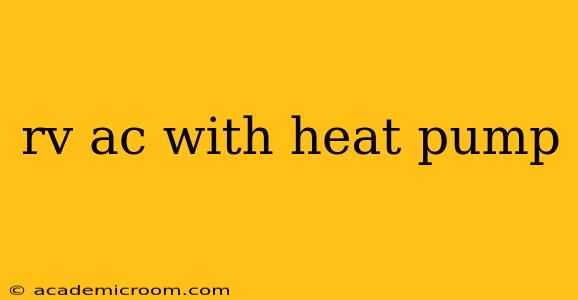Choosing the right air conditioning system for your RV can significantly impact your comfort and enjoyment during travels. RV AC units with heat pumps are becoming increasingly popular, offering a versatile solution for both heating and cooling. This comprehensive guide will explore the benefits, drawbacks, and considerations involved in selecting an RV AC unit with a heat pump.
What is an RV AC Unit with a Heat Pump?
An RV air conditioner with a heat pump uses a refrigeration cycle to both cool and heat your RV. Unlike traditional systems that rely on separate heating elements (like propane or electric furnaces), a heat pump extracts heat from the outside air, even in relatively cold temperatures, and transfers it inside to provide warmth. This dual functionality makes it a highly efficient and versatile option for year-round RVing.
How Does a Heat Pump RV AC Work?
The core of a heat pump system is a refrigeration cycle. In cooling mode, the system draws warm air from inside your RV, cools it using refrigerant, and then blows the cool air back into the RV. The heat absorbed from the inside air is released outside. In heating mode, the process reverses. The system draws heat from the outside air, concentrates it using the refrigerant, and then blows warm air into the RV. This efficient process allows for heating and cooling with a single unit.
Benefits of an RV AC with Heat Pump
- Energy Efficiency: Heat pumps are generally more energy-efficient than traditional electric or propane heaters, especially in milder temperatures. This can lead to lower energy bills and less reliance on propane.
- Dual Functionality: The ability to both heat and cool eliminates the need for a separate heating system, saving space and simplifying your RV's systems.
- Quiet Operation: Many heat pump systems are designed for quieter operation compared to some traditional heating systems.
- Improved Comfort: Consistent temperature control throughout the year enhances comfort, making your RV a more enjoyable living space regardless of the season.
- Environmentally Friendly: Depending on your power source, using a heat pump can reduce your carbon footprint compared to propane heating.
Drawbacks of an RV AC with Heat Pump
- Performance in Extreme Cold: Heat pumps are less efficient in extremely cold temperatures. Below a certain threshold (usually around 20-30°F depending on the model), their heating capacity may be significantly reduced, potentially requiring supplementary heating.
- Higher Initial Cost: Heat pump RV AC units typically have a higher initial purchase price compared to standard AC units without heating capabilities.
- Complexity: Heat pump systems are more complex than traditional systems, which might mean slightly higher maintenance costs or more specialized repair needs.
What are the different types of RV AC units with heat pumps?
While the core technology remains consistent, there are variations in the design and features of RV heat pump AC units. Some units are designed for specific RV sizes and voltage requirements (12V, 110V, etc.). It is essential to choose a unit that is compatible with your RV's electrical system. Consider the BTU (British Thermal Unit) rating, which indicates the unit's cooling and heating capacity. Higher BTU ratings are suitable for larger RVs or those located in hotter or colder climates.
How much does an RV AC unit with a heat pump cost?
The cost of an RV AC unit with a heat pump varies considerably based on the unit's size, brand, features, and retailer. Expect to pay more than a standard AC unit without heating. It's important to shop around and compare prices from different vendors before making a purchase.
Are RV heat pumps worth the investment?
The decision of whether an RV heat pump is worth the investment depends on your individual needs and priorities. If you plan to use your RV year-round or in climates with moderate winters, the energy efficiency, dual functionality, and comfort benefits may outweigh the higher initial cost. However, if you primarily use your RV in warmer months or in areas with extremely cold winters, a standard AC unit might be a more cost-effective choice.
How efficient are RV heat pumps compared to other heating systems?
Compared to propane or electric resistance heating systems, heat pumps offer significantly higher efficiency, particularly in milder temperatures. Their ability to move heat rather than generate it leads to lower energy consumption and operating costs. However, their efficiency decreases in very cold weather.
Can I install an RV AC unit with a heat pump myself?
Installing an RV AC unit, especially one with a heat pump, can be a complex task. Unless you have significant experience with HVAC systems and electrical work, it's recommended to have a qualified technician install the unit to ensure proper functionality and safety.
This comprehensive guide offers valuable insights into RV AC units with heat pumps, enabling you to make an informed decision based on your specific needs and RVing style. Remember to consult with RV specialists and consider the factors discussed above before making a purchase.
